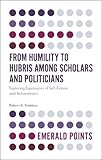From humility to hubris among scholars and politicians : exploring expressions of self-esteem and achievement / by Robert A. Stebbins.
Material type: TextPublisher: Emerald Publishing Limited, Description: 1 online resource (140) pagesISBN: 9781787147577 (e-book)Subject(s): Social psychology | Self-esteem | Social Science -- Sociology / Social Theory | Social theoryAdditional physical formats: No titleDDC classification: 302 LOC classification: HM1019 | .S74 2017Online resources: Click here to access online Summary: A main theme running through this book is that we cannot understand the virtues of humility and modesty without an equally good understanding of the vices of hubris and conceit. All four attitudes express self-esteem, which flourishes in the soil of achievement. Achievement is valued in any challenging field, be it art, science, sport, entertainment, business, politics, religion, or administration. And it is for this reason alone that achievers are inclined to discuss their excellence or may be forced to discuss it when others inquire about it or remark on it. By these routes achievement and self-esteem surface frequently in the diverse academic and political exchanges that spawn humility/modesty or hubris/conceit. Achievement in a respectable activity can be a wonderful personal milestone bathed in positive emotions, where in the modern world individualism and individuation are widely valued. It may also be wonderful for other people in the achiever's family, social network, community, or society when they are favorably affected. But in this book, when refracted through three additional analytic lenses: individualism and individuality, big- vs small-picture thinking, and tolerance and compromise, the expression of achievement-based self-esteem takes on some startling new dimensions. One of them is that, at the hubris/conceit end of the continuum of the expression of self-esteem, discussion risks becoming uncivil, owing to the disagreeable ways that achievement is sometimes conveyed (e.g., boasting, name calling, depreciating others' related achievements). Moreover, such can turn out to be enormously unproductive. Or as Leo Tolstoy once put it: Conceit is incompatible with understanding.
TextPublisher: Emerald Publishing Limited, Description: 1 online resource (140) pagesISBN: 9781787147577 (e-book)Subject(s): Social psychology | Self-esteem | Social Science -- Sociology / Social Theory | Social theoryAdditional physical formats: No titleDDC classification: 302 LOC classification: HM1019 | .S74 2017Online resources: Click here to access online Summary: A main theme running through this book is that we cannot understand the virtues of humility and modesty without an equally good understanding of the vices of hubris and conceit. All four attitudes express self-esteem, which flourishes in the soil of achievement. Achievement is valued in any challenging field, be it art, science, sport, entertainment, business, politics, religion, or administration. And it is for this reason alone that achievers are inclined to discuss their excellence or may be forced to discuss it when others inquire about it or remark on it. By these routes achievement and self-esteem surface frequently in the diverse academic and political exchanges that spawn humility/modesty or hubris/conceit. Achievement in a respectable activity can be a wonderful personal milestone bathed in positive emotions, where in the modern world individualism and individuation are widely valued. It may also be wonderful for other people in the achiever's family, social network, community, or society when they are favorably affected. But in this book, when refracted through three additional analytic lenses: individualism and individuality, big- vs small-picture thinking, and tolerance and compromise, the expression of achievement-based self-esteem takes on some startling new dimensions. One of them is that, at the hubris/conceit end of the continuum of the expression of self-esteem, discussion risks becoming uncivil, owing to the disagreeable ways that achievement is sometimes conveyed (e.g., boasting, name calling, depreciating others' related achievements). Moreover, such can turn out to be enormously unproductive. Or as Leo Tolstoy once put it: Conceit is incompatible with understanding.
| Item type | Current library | Call number | URL | Status | Date due | Barcode |
|---|---|---|---|---|---|---|
 eBook
eBook
|
Digital Library
Resources in this library are accessible in digital format e.g. eBooks or eJournals accessible online. |
HM1019 .S74 2017 (Browse shelf(Opens below)) | Link to resource | Available |
Includes bibliographical references and index.
A main theme running through this book is that we cannot understand the virtues of humility and modesty without an equally good understanding of the vices of hubris and conceit. All four attitudes express self-esteem, which flourishes in the soil of achievement. Achievement is valued in any challenging field, be it art, science, sport, entertainment, business, politics, religion, or administration. And it is for this reason alone that achievers are inclined to discuss their excellence or may be forced to discuss it when others inquire about it or remark on it. By these routes achievement and self-esteem surface frequently in the diverse academic and political exchanges that spawn humility/modesty or hubris/conceit. Achievement in a respectable activity can be a wonderful personal milestone bathed in positive emotions, where in the modern world individualism and individuation are widely valued. It may also be wonderful for other people in the achiever's family, social network, community, or society when they are favorably affected. But in this book, when refracted through three additional analytic lenses: individualism and individuality, big- vs small-picture thinking, and tolerance and compromise, the expression of achievement-based self-esteem takes on some startling new dimensions. One of them is that, at the hubris/conceit end of the continuum of the expression of self-esteem, discussion risks becoming uncivil, owing to the disagreeable ways that achievement is sometimes conveyed (e.g., boasting, name calling, depreciating others' related achievements). Moreover, such can turn out to be enormously unproductive. Or as Leo Tolstoy once put it: Conceit is incompatible with understanding.
Print version record


There are no comments on this title.